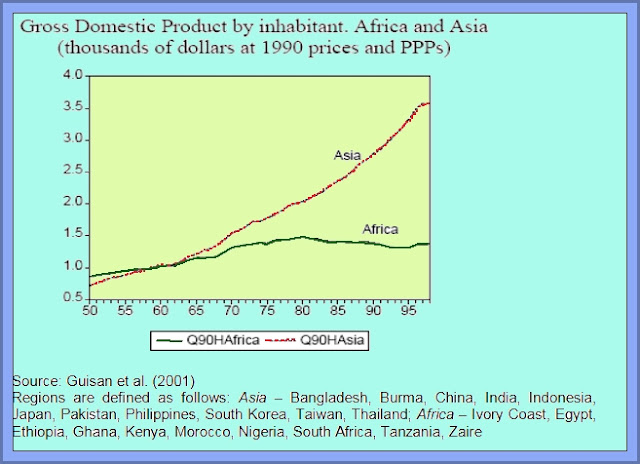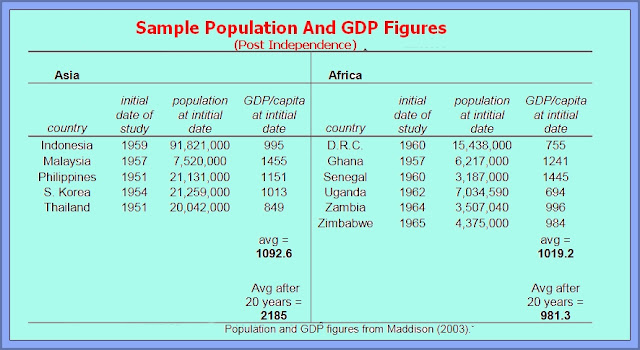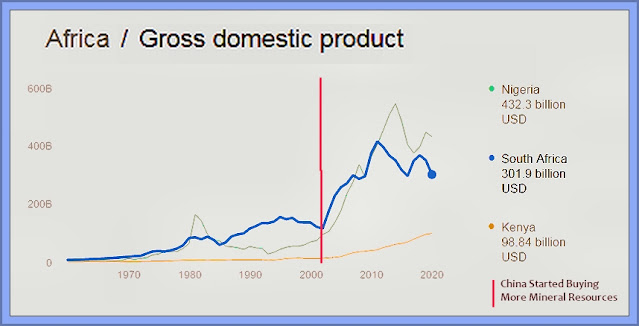I suspect that many western politicians often privately (they would never dare do it publicly), wonder why sub-Saharan African states are so often such basket cases.
 |
| Some African States Have Been Basket Cases For Sixty Years ...... |
The answers they may determine to this question, are no doubt many and varied, and usually not discussed publicly ... especially in these race sensitive times.
But a few of the more prominent that we can still freely discuss are:
- The corruption, both the political and social, which is endemic across
the continent, and means bribes, or even large-scale theft of state funds are common
place, and blights every aspect of public and private life. Equatorial Guinea is a prime example.
- The 'big man' political leaders for life practises, which was/is the norm across the continent in the post colonial period. Equatorial Guinea is also a prime example of this practise.
 |
| GDP Started At The Same Levels But Soon Fell Behind Asia ..... |
- The economic mismanagement, which meant that that
African countries that had better or comparable economic positions than the Asian economies,
when they all became independent in the 1960s, are now trailing far behind
those countries now e.g. Zambia or more recently Zimbabwe. In fact many
African states have made no economic progress in real terms since independence.
 |
| Sub Saharan Population And GDP versus Asian Economies Illustrates GDP Fall |
 |
| Three African Economies GDP |
Now I could elaborate on any or all those points (or even the more sensitive areas that I have opted to avoid in this post). But its a fact that much of Sub Saharan Africa is less industrialised today than it was four decades ago, with the The Economist Intelligence Unit saying that Africa accounted for more than 3% of global manufacturing output in the 1970s, but that this percentage has since halved, and is predicted to not be likely to grow for decades.
Even those Sub Saharan Africa economies that saw some GDP rises in the last 20 years, did so mainly on the back of China's appetite for buying natural mineral resources, and so have an unsustainable feel to them ... when either the resources run dry (Even countries with large oil production revenues to underpin them, are
having to face up long term to the inevitable decline in oil revenues, as the
world electrifies over the next few decades), or China's economic growth plateaus and stops hoovering up resources, then those economies will collapse into negative growth. Mainly because the windfalls have either been mismanaged, stolen, or wasted on non productive expenditure e.g. Ghana and Zambia, who both used profits from the commodity bonanza, to solve short-term domestic problems, such as by increasing salaries for civil servants.
However there was one area in Africa generally, the big man leader for life politician, which appeared to have been finally declining since 2000, and there was real hope that the establishment of viable democracies in the majority of states would lead to the implementation of economic reforms elsewhere, that would address some of the other development issues.
Its a fact that, perhaps China excepted, democracies normally perform better economically than non democracies. However in the case of China, the World Bank has estimated that China's gross national income per capita has grown more than tenfold in the last two decades, from $940 (£714) in 2000, to $10,550 in 2020, creating a growing middle class with disposable incomes.
But in Africa, in the last couple of years, buoyed perhaps by China's investment (which usually ends up as Chinese owned infrastructure, when the African countries default on the non state loans), and commodity and natural resources purchases, there seems to have been some serious back sliding on implementing real democracy.
Now apart from the numerous army coups, which have continued to erupt across the continent in never decreasing numbers (Burkina Faso, Chad, Guinea, Sudan and Mali have all seen their democratic governments overthrown and replaced with a military junta in 2021/22 alone), there are now also indications that rather like the North Korean model, family dynasties are taking root again in many African countries.
- Congo-Brazzaville's President Denis Sassou-Nguesso has appointed his son Denis-Christel as a cabinet minister.
- Gabon President Ali Bongo Ondimba is the son of Omar Bongo, who ruled from 1967 to 2009.
- In the Democratic Republic of Congo Joseph Kabila ruled for 17 years after succeeding his assassinated father Laurent-Désiré as head of state in 2001.
- Equatorial Guinea's President Teodoro Obiang who himself rose to power by deposing his tyrannical uncle Francisco Macías Nguema, the country's first head of state, back in 1979 - has installed his son, Teodoro Nguema Obiang Mangue as vice-president, and in certain position to succeed him ... well almost certain, as gossip states that some family members are said to favour an alternative presidential son, Oil Minister Gabriel Mbega Obiang Lima. So either way it will stay in the family.
- Chad's President Idriss Déby died from wounds inflicted by rebels. But never fear, his son Mahamat has stepped into the power breach as leader of the armed forces and leader of the 'interim ruling military council'.
- In the Cameroon, an anonymous peoples movement has miraculously sprung up to campaign for Franck Biya, son of the 88-year-old President Paul Biya as the possible successor.
- Uganda is seeing a social media campaign touting General Muhoozi Kainerugaba, son of current head of state Yoweri Museveni, as a potential governing party candidate for the next election in 2026.
- In the Gabon, President Ali Bongo seems to be preparing the next step in late 2019 by having appointed his son Nourredin Bongo Valentin as "general coordinator of presidential affairs".
The West has never taken a firm and strong view on the link between aid and democracy in
Africa (or elsewhere for that matter), and this has led to many African
states feeling no imperative or incentive to adopt good democratic and economic practice, and implement political transparency. This emboldens the political and business elite to backslide on any promises made either to their own populations, or to Western donors.
Perhaps the youth of Africa's black populations, will mean that these political dynasty plans don't stick, but even the increasingly youthful and urbanised Africans, will probably not be able to achieve their growing expectations of change, when faced with a system of political corruption that has survived for more than 60 years, or ever since independence in many instances.
China on the other hand gives no string, state or non-state loans, but that can only be used on Chinese firms building the infrastructure, that it keeps if, or rather when, the African state fail to repay the loans. For example Zambia’s new government has revealed that the country owes Chinese lenders more than $6bn (£4.4bn), out of a total of $14.5bn owed to creditors. For the first time since 1998, Zambia plunged into a recession last year. It also defaulted on a debt repayment, and the country has been talking to the International Monetary Fund about restructuring the debts.
But even so, China's continued belts and braces buying up of African resources (via these defaulted private loans), means that there is still plenty of money slushing around, for these corrupt regimes to finance power for a few more decades.
We are losing this second cold war, and Africa is sliding backward again as a result.
Now apart from the damage this does to Africa itself, it also leads to ever more
Africans trying to use refugee status claims, to enter Europe or North
America. This makes it a concern to everyone, and not just an Africa problem.
This mass migration to better run countries isn't really sustainable (even if European populations collapse by the end of the century, as some believe will happen), and probably won't end well .....








No comments:
Post a Comment
All comments are welcomed, or even just thanks if you enjoyed the post. But please make any comment relevant to the post it appears under. Off topic comments will be blocked or removed.
Moderation is on for older posts to stop spamming and comments that are off topic or inappropriate from being posted .... comments are reviewed within 48 hours. I don't block normal comments that are on topic and not inappropriate. Vexatious comments that may cause upset to other commentators, or that are attempting to espouse a particular wider political view, are reviewed before acceptance. But a certain amount of debate around a post topic is accepted, as long as it remains generally on topic and is not an attempt to become sounding board for some other cause.
Final decision on all comments is held by the blog author and is final.
Comments are always monitored for bad or abusive language, and or illegal statements i.e. overtly racist or sexist content. Spam is not tolerated and is removed.
Commentaires ne sont surveillés que pour le mauvais ou abusif langue ou déclarations illégales ie contenu ouvertement raciste ou sexiste. Spam ne est pas toléré et est éliminé.